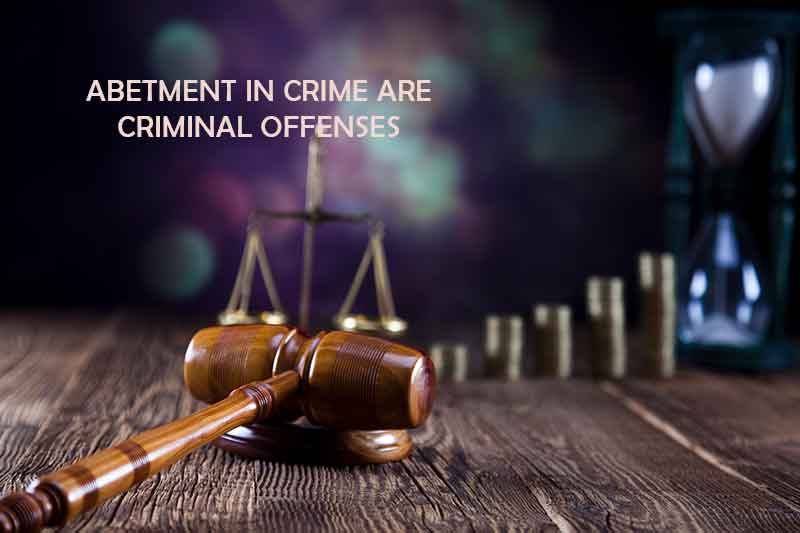The United Arab Emirates maintains a steadfast position on holding individuals accountable for criminal acts, encompassing not only the direct perpetrators but also those who aid or abet in the commission of unlawful activities. The concept of aiding and abetting entails the intentional facilitation, encouragement, or assistance in the planning or execution of a criminal offense. This legal principle ascribes culpability to individuals for their conscious involvement, even if they did not directly perpetrate the crime themselves. Within the UAE’s legal framework, aiding and abetting can result in severe penalties, often commensurate with the punishments prescribed for the principal offense.
Garnering a comprehensive understanding of the ramifications associated with this principle is of paramount importance for residents and visitors alike, as inadvertent actions or omissions can potentially implicate them in criminal proceedings, necessitating a thorough grasp of the relevant legal provisions.
What Constitutes Aiding and Abetting a Crime under UAE Law?
The United Arab Emirates’ current Penal Code, Federal Decree-Law No. 31 of 2021 [On the Issuance of the Crimes and Penalties Law], provides the legal definition of what constitutes aiding and abetting a crime. According to Articles 45 and 46 of this law, a person is considered an accomplice if they intentionally and knowingly assist or facilitate the commission of a criminal act.
Intention and knowledge of the crime are crucial factors in determining accomplice liability under UAE law. Mere presence at the scene of a crime, without active participation or intent to aid the perpetrator, does not automatically constitute aiding and abetting. The extent of an accomplice’s involvement dictates the severity of the penalty they face. Article 46 states that an accomplice may receive the same penalty as the perpetrator or a lesser punishment, depending on the specific circumstances and their level of participation in the criminal act.
Some examples of actions that could constitute aiding and abetting under UAE law include providing weapons, tools or other means to commit the crime, encouraging or instigating the perpetrator, assisting in the planning or execution stages, or helping the perpetrator evade justice after the fact.
It is important to note that the legal interpretations and applications are ultimately at the discretion of UAE judicial authorities on a case-by-case basis.
اڀار جا عنصر
هڪ عمل لاءِ اهليت جي طور تي قابليت حاصل ڪرڻ لاءِ، ٻه اهم عنصر ملڻ گهرجن:
- Actus Reus (ڏوھاري قانون): هي اشتعال جي مخصوص ڪارناما ڏانهن اشارو ڪري ٿو، سازش ۾ مشغول، يا ارادي امداد. Actus reus هڪ جرم جو جسماني جزو آهي، جهڙوڪ ڪنهن کي چوري ڪرڻ جي حوصلا افزائي ڪرڻ يا انهن کي ائين ڪرڻ لاء وسيلا مهيا ڪرڻ.
- Mens Rea (The Guilty Mind): مشتعل کي لازمي طور تي مجرمانه ڏوهن جي ڪميشن کي ڀڙڪائڻ، مدد ڪرڻ يا سهولت ڏيڻ جو ارادو هجڻ گهرجي. Mens rea هڪ جرم جي ذهني عنصر ڏانهن اشارو ڪري ٿو، جهڙوڪ ڪنهن جي مدد ڪرڻ جو ارادو هڪ جرمي عمل.
اضافي طور تي، عام طور تي ڪا به ضرورت ناهي ته ڏوهن کي اصل ۾ ڪاميابيء سان ڪاميابيء جي قانون تحت ذميواري لاء انجام ڏنو وڃي. ڏوهن کي فروغ ڏيڻ لاءِ صرف انهن جي نيت ۽ عملن جي بنياد تي مقدمو هلائي سگهجي ٿو، جيتوڻيڪ جرم پاڻ ڪڏهن به مڪمل نه ٿيو هو.
ابتڙ جا قسم يا فارم
اتي ٽي بنيادي طريقا آھن جرم تڪليف ٿي سگھي ٿي:
1. اشتعال
سڌي يا اڻ سڌي طرح بيان ڪيل وسيلي, اشتعال ڏيڻو آهي, همٿ، يا طلب ڪو ٻيو جرم ڪرڻ لاء. اهو ٿي سگهي ٿو لفظن، اشارو، يا رابطي جي ٻين ذريعن ذريعي. انسٽيگيشن کي فعال شموليت ۽ مجرمانه ارادي جي ضرورت آهي. مثال طور، جيڪڏهن ڪو ماڻهو بار بار پنهنجي دوست کي بئنڪ چوري ڪرڻ لاءِ ٻڌائي ٿو ۽ تفصيلي منصوبا فراهم ڪري ٿو ته اهو ڪيئن ڪجي، اهي جرم کي اڀاري ڏيڻ جو ڏوهي ٿي سگهن ٿا، جيتوڻيڪ اهو دوست ڪڏهن به ڦرلٽ جي پيروي نه ڪري.
2. سازش
An معاهدي ٻن يا وڌيڪ ماڻهن جي وچ ۾ جرم ڪرڻ لاء. گهڻو ڪري سمجهيو ويندو آهي زبردستي جي سڀ کان وڌيڪ سنگين شڪل، سازش صرف معاهدي جي ضرورت آهي، بغير ڪنهن به وڌيڪ قدمن يا عملن جي. هڪ سازش موجود ٿي سگهي ٿي جيتوڻيڪ اهي ماڻهو ڪڏهن به منصوبابندي ڪيل جرم کي انجام نه ڏيندا آهن.
3. ارادي امداد
مدد يا وسيلن جي فراهمي جهڙوڪ هٿيار، نقل و حمل، مشوري جيڪا ارادي طور تي هڪ مجرمانه عمل ۾ مدد ڪري ٿي. ارادي امداد جي ضرورت آهي فعال پيچيدگي ۽ نيت. ذميداري لاڳو ٿئي ٿي جيتوڻيڪ ڏوهن جي منظر تي جسماني طور تي موجود نه آهي. مثال طور، جيڪڏهن ڪو ماڻهو ڄاڻي واڻي پنهنجي ڪار کي ڪنهن دوست کي قرض ڏئي ٿو ته رٿيل ڦرلٽ ۾ استعمال ڪرڻ لاءِ، اهي ڏوهي ٿي سگهن ٿا ڏوهن جي مدد ڪرڻ جي ارادي سان.
Difference between Abettor and Offender
| Abettor (Accomplice) | Offender (Perpetrator) |
|---|---|
| An abettor or accomplice is an individual who intentionally aids, facilitates, encourages, or assists in the planning or execution of a criminal act. | An offender, also known as a perpetrator, is the individual who directly commits the criminal act. |
| Abettors do not directly commit the crime themselves but knowingly contribute to its commission. | Offenders are the principal actors who carry out the unlawful act. |
| Abettors can be held liable for their role in supporting or enabling the crime, even though they did not personally carry it out. | Offenders are primarily responsible for the criminal offense and face the full extent of the prescribed punishment. |
| The level of involvement and intent determines the extent of an abettor’s culpability and punishment, which may be equal to or lesser than the offender’s. | Offenders typically receive the maximum penalty for the committed crime, as they are the direct perpetrators. |
| Examples of abetting actions include providing weapons, tools, or assistance, encouraging or instigating the crime, aiding in planning or execution, or helping the offender evade justice. | Examples of offender actions include physically committing the criminal act, such as theft, assault, or murder. |
| Abettors can be charged as accomplices or co-conspirators, depending on the specific circumstances and their level of involvement. | Offenders are charged as the principal perpetrators of the crime. |
This table highlights the key differences between an abettor (accomplice) and an offender (perpetrator) in the context of criminal acts, based on their level of involvement, intent, and culpability under the law.
Punishment for Abetting a crime in UAE
According to the UAE Penal Code (Federal Decree-Law No. 31 of 2021), the punishment for abetting a crime depends on the nature of the abettor’s involvement and the specific crime they aided or abetted. Here’s a table outlining the potential punishments based on different types of abetment:
| Primary Type | وضاحت | سزا |
|---|---|---|
| Instigation | Deliberately encouraging or urging another individual to engage in criminal conduct. | Equivalent to the penalty imposed on the principal offender if the instigator was aware of the intended crime (Article 44 of the UAE Penal Code). |
| سازش | A premeditated agreement among two or more parties to carry out an unlawful act. | Conspirators are generally subjected to the same punishment as the main perpetrator. Nonetheless, the judge retains discretionary power to reduce the sentence (Article 47 of the UAE Penal Code). |
| Intentional Aiding | Knowingly providing assistance or support to another person with the understanding that they plan to commit a crime. | The severity of the penalty varies, contingent upon the gravity of the offense and the degree of assistance rendered. Punishments can range from monetary fines to incarceration (Article 48 of the UAE Penal Code). |
What are the defenses Against Abetment Charges in UAE
جڏهن ته زبردستي هڪ سنگين جرم سمجهيو ويندو آهي، ڪيترائي قانوني دفاع موجود آهن ته هڪ تجربيڪار فوجداري دفاعي وڪيل ملازمت ڪري سگهي ٿو:
- گهربل ارادي يا ڄاڻ جي کوٽ: جيڪڏهن ابتر ڪندڙ جرم جي مدد يا حوصلا افزائي ڪرڻ جو ارادو نه ڪيو هو، يا ڪارناما جي جرمي نوعيت کان بي خبر هو، اهو هڪ دفاع مهيا ڪري سگهي ٿو.
- مجرمانه سازش کان واپسي: جيڪڏهن مجرم سازش کان پوئتي هٽي ويو ته ڏوهه ٿيڻ کان اڳ ۽ ان جي واقعن کي روڪڻ لاء قدم کنيا، اهو ذميواري کي رد ڪري سگهي ٿو.
- زبردستي يا جبر جي دعويٰ: جيڪڏهن متاثر ڪندڙ کي نقصان يا تشدد جي خطري هيٺ جرم جي مدد يا حوصلا افزائي ڪرڻ تي مجبور ڪيو ويو، اهو هڪ دفاع جي طور تي ڪم ڪري سگهي ٿو.
- ڪارڪردگي ۽ ڏوهن جي وچ ۾ ناڪامي سببن جو مظاهرو ڪيو: جيڪڏهن ابتر جي ڪارناما سڌو سنئون ڏوهن جي ڪميشن ۾ مدد نه ڪئي، اهو ذميواري قائم ڪرڻ لاء پراسيڪيوشن جي ڪيس کي ڪمزور ڪري سگهي ٿو.
- Mistake of fact: If the abettor had a reasonable belief that the act they aided or abetted was not illegal, based on a mistake of fact, this could provide a defense.
- Entrapment: If the abettor was induced or entrapped by law enforcement to aid or abet the crime, this could potentially serve as a defense.
- Statute of limitations: If the prosecution of the abetment charge is brought after the legally prescribed time limit or statute of limitations, this could result in dismissal of the case.
امڪاني حڪمت عملين کي سمجھڻ ۽ ڪيس جي قانون جي اڳڪٿين کي استعمال ڪرڻ اھميت جي الزامن جي خلاف موثر دفاع جي تعمير لاءِ اھم آھن.
ٿڪل
UAE ۾ حرڪت جي جرم کي روشنيءَ سان نه ورتو وڃي. ڪنهن به ڏوهن جي عمل ۾ حوصلا افزائي ڪرڻ، حوصلا افزائي ڪرڻ، يا مدد ڪرڻ تي سخت سزائون هونديون آهن، جيتوڻيڪ اهو جرم پاڻ ڪڏهن به ڪاميابيءَ سان انجام نه ڏنو ويو هو. مخصوص عناصرن جي مضبوط سمجھ، قسم جي تڪليف، سزا جي قانونن، ۽ امڪاني قانوني دفاعن لاء ضروري آھي سڀني UAE جي شھرين لاءِ انھن پيچيده قانونن سان الجھن کان بچڻ لاءِ. هڪ تجربيڪار فوجداري دفاعي وڪيل کي جلد کان جلد صلاح ڪرڻ جو مطلب ٿي سگهي ٿو جيل ۾ سالن جي خدمت ڪرڻ يا مڪمل طور تي پراسيڪيوشن کان بچڻ جي وچ ۾ فرق.
جيڪڏهن توهان جي تحقيق ڪئي وئي آهي، گرفتار ڪيو ويو آهي، يا متحده عرب امارات ۾ بدعنواني سان لاڳاپيل ڏوهن جو الزام آهي، اهو ضروري آهي ته فوري طور تي قانوني صلاحڪار ڳولڻ ضروري آهي. هڪ ڄاڻڻ وارو وڪيل توهان کي قانوني عمل ذريعي رهنمائي ڪري سگهي ٿو، توهان جي حقن جي حفاظت ڪري سگهي ٿو، ۽ توهان جي ڪيس لاءِ بهترين ممڪن نتيجو کي يقيني بڻائي سگهي ٿو. ڪوشش نه ڪريو پنھنجي پاڻ تي بيٽمينٽ جي قانونن جي پيچيدگين کي نيويگيٽ ڪرڻ - جيترو جلد ٿي سگھي قانوني نمائندگي برقرار رکو.
توهان جي قانوني اسان سان صلاح توھان جي صورتحال ۽ خدشن کي سمجھڻ ۾ اسان جي مدد ڪندو. اسان سان رابطو ڪريو گڏجاڻي کي شيڊول ڪرڻ لاءِ. +971506531334 +971558018669 تي هڪ تڪڙي ملاقات ۽ ملاقات لاءِ هاڻي اسان کي ڪال ڪريو

